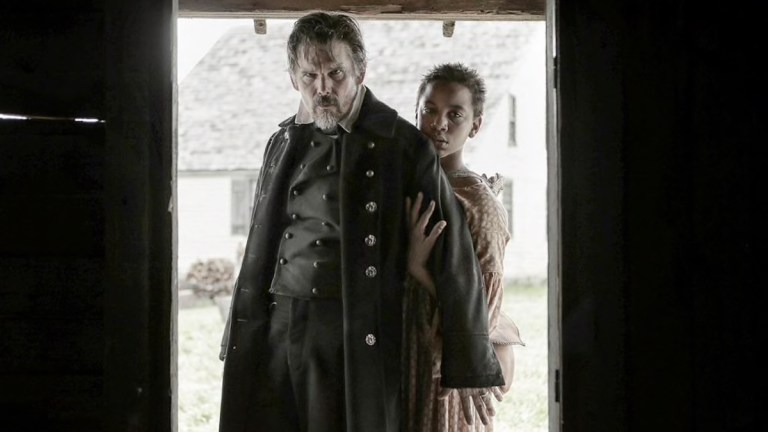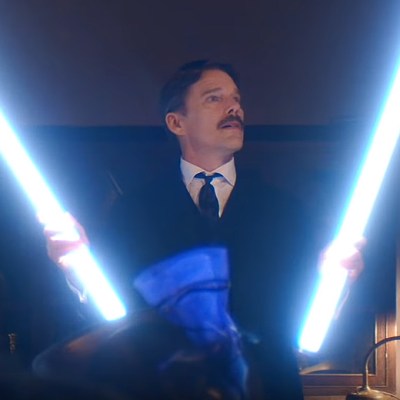The Good Lord Bird Episode 1 Review: Meet the Lord
Ethan Hawke breathes fire in the strong debut of The Good Lord Bird, a humorous and ambiguous portrait of John Brown, the double-barreled abolitionist.

This The Good Lord Bird review contains spoilers.
Who was John Brown, really? A hero or a madman? A visionary as divinely driven as Moses in the Good Book, or a bloodthirsty zealot who participated in murderous acts of terrorism? It’s a big question that’s pestered American history for centuries, and even Brown’s lifetime. As Showtime’s new series The Good Lord Bird reminds folks in its first episode, before his failed raid on Harper’s Ferry escalated tensions to a fever pitch in the prelude to the Civil War, Brown was one of the most celebrated (or notorious) roustabouts in the Kansas territory during its “bleeding.”
In his lifetime he was seen as a militant leader for the abolitionist cause, and therefore a menace to Pro-Slavery forces in Kansas, Missouri, and the other areas that began practicing their “Border War” well before South Carolinians fired on Fort Sumter in 1861. In death, his legend was the impetus for the original version of the “Battle Hymn of the Republic” and a mural that still draws criticism in the Kansas State Capitol building, in which Brown’s depicted as holding a Bible in one hand, open at the Book of Revelations, and a rifle in the other. A bloodstained messiah.
The complicated nature of the man’s legacy is likely a key reason Hollywood has relatively steered clear of the figure—that and the Southern Revisionism “Lost Cause” myth America placated during most of the 20th century, which saw Brown as nothing more than a terrorist. Quentin Tarantino at one point mused about making a John Brown movie that would’ve probably been about as nuanced as the last half hour of Django Unchained, but told strictly from the point-of-view of a white savior. I suspect we’re lucky we finally got The Good Lord Bird instead.
Based on James McBride’s award winning novel, which I admittedly have never read, the new Showtime miniseries charged out of the gate with a sweaty, bug nut premiere that breathes as much fire as Ethan Hawke’s tremendous approximation of Old Man Brown. McBride’s book has been compared to Mark Twain, and even from a fraction of the series it’s easy to see why. While we have yet to truly know Joshua Caleb Johnson’s Henry Shackleford—mistakenly dubbed Henrietta and then Onion by Brown—his perspective on the pistol-wielding abolitionist opens up the series to evaluate Brown in all his paradoxes and hypocrisies, with a wary sense of irony and folksy detachment.
As narrated by Johnson’s voiceover, Onion muses, “Some Black folks love him, they think trouble needed to be stirred. Some Black folks hate him for thinking he was some sort of bullshit white savior.” Framing the question of John Brown in this context is key to the success of the series’ first hour; it’s also the key for getting to know the man’s biggest legacy. For what perhaps matters most today is how he’s perceived by the oft-marginalized Black perspective he claimed to live and die for. And from this vantage, the truth is somewhat more aloof than any single mural can demonstrate.
Through the eyes of Onion, and later another liberated (and conscripted) slave named Bob (Hubert Point-Du Jour), we can view Brown as a figure of righteousness and ridiculousness, a leader and a lunatic. All of this is apparent in how he liberates of Onion with a condescending paternalism that’s as ludicrous as the dress that Onion wears.
Indeed, the opening scene of the series begins with Brown’s face totally obscured. In his mind, this is probably a moment of Robin Hood like deception and adventurism, and the way it’s crafted by Hawke and Mark Richard’s teleplay looks something closer to Clint Eastwood’s “Man with No Name” entrance in a Spaghetti Western. Yet for all of Brown’s braggadocio as he rightly condemns the wickedness of slavery and the atrocities committed by red shirted (Pro-Slavery) radicals in the territory, the scene is mostly filmed from the perspective of young Henry and his father; the latter an enslaved man who gets slaughtered in the crossfire of Brown’s antics. So how does Brown honors the old man’s memory? He frees his son, but with an extreme amount possessiveness. He doesn’t even bother to actually learn the lad’s real name… or that he’s a lad.
Unable to see the smooth lines of Johnson’s face are the countenance of youth—and perhaps not looking too closely at the Black faces he claims to view as his own kin—Brown perceives Henry as a girl, and nothing more, and further renames “her” as Onion. Because her identity or experiences before she met him is inconsequential. She should just be glad she is free to follow his riders through Bleeding Kansas.
“Whatever he believed, he believed. Doesn’t matter whether it was true or not. He was a real white man.” In this way, The Good Lord Bird implements a modern understanding of white privilege on the historic personage of John Brown without betraying the actual history, or at least the legend of the man. Because as the rest of the hour attests, the individual facts of John Brown’s life matter less than an exploration of his legend and why it still matters. The way Onion, at least for now, goes along with Brown’s insistence that he should wear a dress and be treated as a lady, as well as the way Brown forces a long knife in Bob’s hand, lightly touches on the intense entitlement of a self-appointed white savior. Yet the real appeal of The Good Lord Bird as a series is it doesn’t appear interested in evaluating these characters from a strictly modern gaze, or only wishing to dip its toe in the shallow end of the pool when it comes to diving into Brown’s psychology.
“Meet the Lord” is a guns blazing showcase for Hawke as both an actor and co-writer. Straining his voice to the point where it sounds like fingernails being drawn across the inside of his throat, and alternating his glances somewhere between dead-eyed and hellfire, Hawke’s protagonist makes for an immediately bemusing and endearing figure. His cause is just, and the more he rants about it like a broken video game NPC trapped in a dialogue loop, the more his madness flirts with likability.
During the climax of the first episode, the Battle of Black Jack, he is ranting about God protecting them because they have a woman on their side, and yet he also is taking a moment between gunshots to sift through the belongings of a dead ally, stating, “If you don’t make time for God, God will make time for you” as he pockets a gold watch. It’s not that he is a hypocrite; he’s just delightfully oblivious, unconcerned or unaware that as he approaches battle, white followers are quietly ducking out behind him as they ride into the woods.
And yet, this is contradicted by an earlier scene, in which director Albert Hughes’ usually wry direction suddenly becomes as bleakly ominous as a modern horror movie (Jason Blum is also an executive producer on the series). While as far as I’m aware, the real Brown only executed men believed to be slave hunters, such barbarism is depicted here as befalling a man who doesn’t even own slaves… he just wishes he could afford them and votes to make Kansas a slave state. A dim Red Shirt follower, whether this farmer committed any actual violence against a Black body or Free Stater is ambiguous. Even if he participated in raid on Lawrence (which he denies), that technically only led to one Pro-Slavery follower’s death.
Thus suddenly all the demented folksiness that makes Hawke’s performance inviting in other scenes is recast by the long shadows of candlelight, and the lower angled framing of a horror movie villain. And that contradiction is not hand-waved away or even grappled with. Brown is a man who lives and breathes abolition, but has no qualms about decapitating a family man whose culpability may be strictly in his own mind. It is refreshing to see modern television living in the muddy grays of humanity, as opposed to just blacks and whites, which is increasingly becoming the norm.
It’s all aided by Hawke’s performance, which could risk becoming parody if not for the actor’s absolute conviction in every grandiose rambling. In fact, it’s such a big performance the first hour’s one shortcoming is it doesn’t have a lot of room for anyone else to standout. It is only the first hour, so I’ll reserve judgment on how circumspect Onion remains despite being the narrator of the story, but Brown’s sons, and their interpersonal conflicts, felt obligatory despite taking up a fair amount of screen time. So much so that when one of Brown’s allies—a reverend who rode with Free Staters, yet took inexplicably took umbrage at being forced to ride with a Black girl—murders John’s most dim-witted son, the tragedy and significance of the slaying appears muted and papered over.
Prior to his death, Frederick Brown (Duke Davis Roberts) introduces Onion to a Good Lord Bird, saying in so many words that the creature brings you luck. It’s currently unclear if Brown is the good luck Onion needs or if it’s the other way around, but the first hour at least established a serendipitous rapport between these two. While most of Onion’s thoughts on this real white man are kept to himself in the narration, both that voiceover’s cadence and the overall tone of the series is executed with sing-song-y appeal. Likely pulling in large chunks from McBride’s own text, the show enjoys an acuity of dialogue that paints its subject matter vividly, even when he’s pontificating some authentic frontier gibberish. All of which makes this Good Lord Bird soar fairly high in its maiden voyage.

